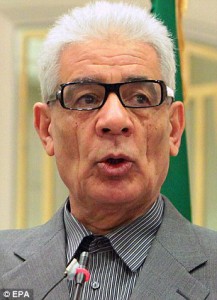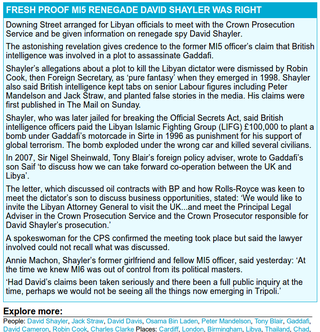Sometimes I sit here reading the news — on subjects in which I take a deep interest such as the recent police investigation into UK spy complicity in torture, where the police decided not to prosecute — and feel that I should comment. But really, what would be the point? Of course the police would not find enough concrete evidence, of course no individual spies would be held to account, despite the fact that the British government has already paid massive settlements to the victims.
 Now there are reports that the police will be investigating MI6 involvement in the extraordinary rendition and torture of two Libyans. The case appears bang to rights, with documentary evidence that high-ranking MI6 officers and government ministers were involved in and approved the operation. Yet I’m willing to bet that the plods at Scotland Yard will still not be able to find the requisite evidence to prosecute anybody.
Now there are reports that the police will be investigating MI6 involvement in the extraordinary rendition and torture of two Libyans. The case appears bang to rights, with documentary evidence that high-ranking MI6 officers and government ministers were involved in and approved the operation. Yet I’m willing to bet that the plods at Scotland Yard will still not be able to find the requisite evidence to prosecute anybody.
The inevitable (and probably wished-for outcome on the part of the authorities) is that people become so weary and cynical about the lack of justice that they stop fighting for it. And they can temporarily succeed, when we succumb to cynical burnout.
But the case reported in today’s Daily Mail, that of a young British student facing extradition to the US despite having broken no laws in the UK, succeeded in rousing my wrath.
 The hapless 23-year old Richard O’Dwyer faces 10 years in a maximum security American prison. His crime, according to the US, is that he set up a UK-based website that provided links to other international websites that allegedly hosted copyright material.
The hapless 23-year old Richard O’Dwyer faces 10 years in a maximum security American prison. His crime, according to the US, is that he set up a UK-based website that provided links to other international websites that allegedly hosted copyright material.
This case is so troubling on so many levels it is difficult to know where to begin. There are issues around the crackdown of US corporate copyright law, issues around the inequality of the unilateral Extradition Act 2003, and historic questions of US hypocrisy about extradition.
So let’s start with the unsupported allegations against poor Richard O’Dwyer. He is a student who built a website that collated a list of sites in other countries that host films, books and music for free download. O’Dwyer did not himself download any copyrighted material, and the websites he linked to were apparently within jurisdictions where such downloads are not illegal. Providing a signpost to other legal international sites is manifestly not a crime in the UK and he has never been charged.
However, over the last couple of decades the US entertainment lobby has been fighting a vicious rearguard action against copyright infringement, starting with the music, then the film, and now the publishing industry. The lobbyists have proved victorious and the invidious SOPA and PIPA laws are soon to be passed by the US Congress. All well and good you might think — it’s one of those mad US issues. But oh no, these laws have global reach. What might be legal within the UK might still mean that you fall foul of US legislation.
 Which is where the Extradition Act 2003 becomes particularly threatening. This law means that any UK citizen can be demanded by and handed over to the US with no prima facie evidence. As we have seen in the appalling case of alleged hacker Gary McKinnon, it matters not if the “crime” were committed on UK soil (as you can see here, McKinnon’s case was not prosecuted by the UK authorities in 2002. If it had been, he would have received a maximum sentence of 6 months’ community service: if extradited he is facing up to 70 years in a US maximum security prison).
Which is where the Extradition Act 2003 becomes particularly threatening. This law means that any UK citizen can be demanded by and handed over to the US with no prima facie evidence. As we have seen in the appalling case of alleged hacker Gary McKinnon, it matters not if the “crime” were committed on UK soil (as you can see here, McKinnon’s case was not prosecuted by the UK authorities in 2002. If it had been, he would have received a maximum sentence of 6 months’ community service: if extradited he is facing up to 70 years in a US maximum security prison).
The UK government has tried to spin the egregious Libyan cases as “judicial rendition” rather than “extraordinary kidnapping” or whatever it’s supposed to be. So I think it would be accurate to call Gary McKinnon’s case “judicial rendition” too, rather than boring old extradition.
Richard O’Dwyer apparently didn’t commit anything that could be deemed to be a crime in the UK, and yet he is still facing extradition to the US and a 10 year stretch. The new US laws like SOPA threaten all of us, and not just with judicial rendition.
As I have mentioned before, digital rights activist Cory Doctorow summed it up best: “you can’t make a system that prevents spying by secret police and allows spying by media giants”. These corporate internet laws are a Trojan horse that will threaten our basic civil liberties across the board.
So now to my third point. The hypocrisy around the American stance on extradition with the UK is breathtaking. The UK has been dispatching its own citizens off at an alarming rate to the “tender” mercies of the US judicial system since 2004, with no prima facie evidence required. In fact, the legal proof required to get a UK citizen extradited to the US is less than that required for someone to be extradited from one US state to another.
The US, on the other hand, delayed ratifying the law until 2006, and the burden of proof required to extradite someone to the UK remains high, so it is unbalanced not only in concept but also in practice. And this despite the fact that the law was seen as crucial to facilitate the transfer of highly dangerous terrorist suspects in the endless “war on terror”.
Why has this happened? One can but speculate about the power of the Irish lobby in the US government, as Sir Menzies Campbell did during a parliamentary debate about the Act in 2006. However, it is well known that the US was remarkably coy about extraditing IRA suspects back to the UK to stand trial during the 30-year “Troubles” in Northern Ireland. We even have well-known apologists such as Congressman Peter King, the Chairman of the Homeland Security Committee attempting to demonise organisations like Wikileaks as terrorist organisations, while at the same being a life-long supporter of Sinn Féin, the political wing of the Provisional IRA.
 The double standards are breath-taking. The US dictates an extradition treaty with the UK to stop terrorism, but then uses this law to target those who might potentially, tangentially, minutely threaten the profits of the US entertainment mega-corps; and then it delays ratifying and implementing its own law for potentially dubious political reasons.
The double standards are breath-taking. The US dictates an extradition treaty with the UK to stop terrorism, but then uses this law to target those who might potentially, tangentially, minutely threaten the profits of the US entertainment mega-corps; and then it delays ratifying and implementing its own law for potentially dubious political reasons.
And the UK government yet again rolls over and takes it, while innocent students such as Richard O’Dwyer must pay the price. As his mother is quoted as saying: “if they can come for Richard, they can come for anyone”.
















